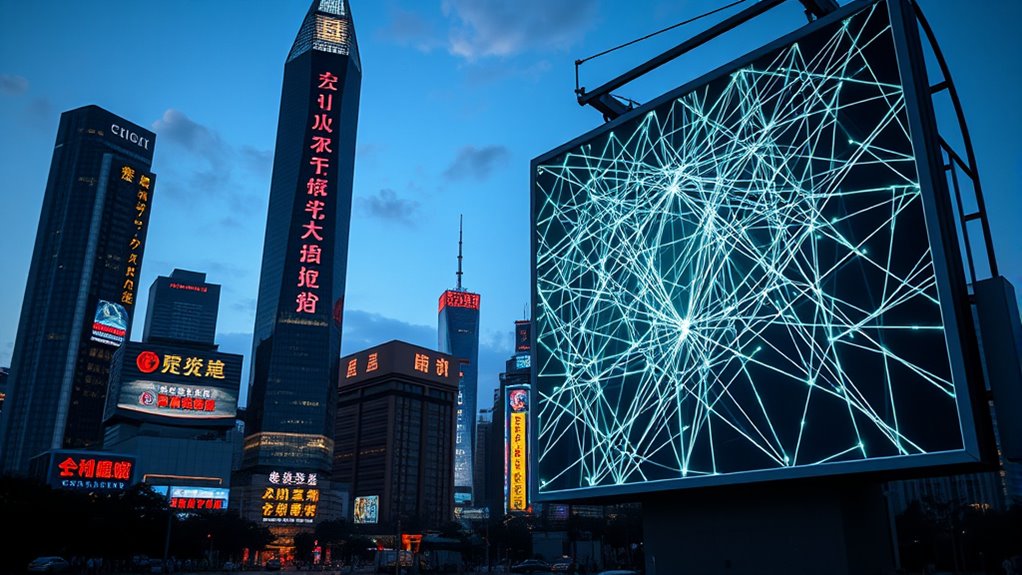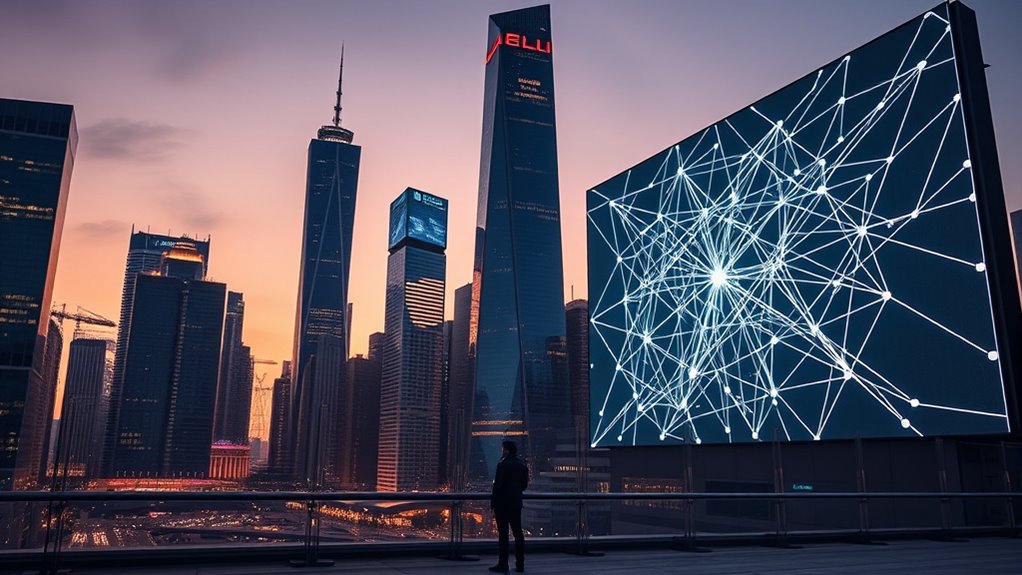China’s Great Firewall acts like a digital barrier that controls your online experience by filtering and blocking access to many foreign websites like Google, Facebook, and Twitter. It uses advanced tools such as IP blocking, keyword filtering, and AI to monitor and censor content. This creates a segmented internet called the splinternet, limiting your exposure to independent information and shaping what you see online. If you want to understand how it all works and why it’s so strict, keep exploring.
Key Takeaways
- The Great Firewall blocks and filters foreign websites and content deemed sensitive or inappropriate by Chinese authorities.
- Censorship employs IP blocking, DNS tampering, keyword filtering, and AI tools for real-time suppression of dissent.
- It creates a segmented “Splinternet,” isolating China’s online environment from the global web and shaping user experiences.
- The censorship system supports government goals of social stability, political control, and propagating official narratives.
- Advanced censorship technologies make bypassing restrictions increasingly difficult, reinforcing the Chinese Communist Party’s digital dominance.

Have you ever wondered how China controls its online space? It’s a complex system designed to regulate what people can access and share on the internet, and at its core is the formidable Great Firewall. This digital barrier enforces strict digital censorship, filtering out content deemed sensitive or inappropriate by the government. When you try to access foreign websites like Google, Facebook, or Twitter from within China, you quickly realize that these platforms are blocked or heavily restricted. This isn’t accidental; it’s a deliberate effort to shape the online environment and limit exposure to information that might challenge official narratives. The result is a form of internet isolation that cuts citizens off from the free flow of global information, creating a self-contained digital universe. By controlling what information is available, authorities can influence public opinion and suppress dissent.
The Great Firewall doesn’t operate in isolation; it’s part of a broader strategy to implement digital censorship across the country. Through sophisticated technologies like IP blocking, DNS tampering, and keyword filtering, the Chinese government effectively monitors and suppresses online content. When you attempt to search for topics related to political protests, human rights, or criticism of the government, your access may be blocked, or the results may be censored. This level of control means that the internet isn’t a free space for open discussion but a carefully curated environment. As a user, you might notice that certain websites are completely unavailable or that search results are limited, shaping your perception of reality and restricting your access to independent information sources. Additionally, the use of advanced content filtering techniques ensures that even indirect references to sensitive topics are often obstructed or sanitized. Modern censorship tools employ artificial intelligence to detect and suppress sensitive information in real time, making it increasingly difficult to bypass restrictions. This digital censorship leads to a fragmented internet landscape, often called the “Splinternet,” where different regions or countries have vastly different online experiences. In China, the internet is heavily segmented from the rest of the world, creating a closed digital ecosystem. This segmentation is reinforced by the government’s strict regulations, which further restrict the types of content that can be shared or accessed online. The implementation of these controls is supported by AI-driven censorship tools, which efficiently detect and suppress sensitive information in real time. For you, this means that the content you consume is filtered and monitored, and your online interactions are subject to government oversight. While the rest of the world enjoys open access to worldwide platforms and information, China’s internet users navigate a constrained digital world, where the flow of information is carefully managed. This separation isn’t just about censorship; it’s about maintaining social stability and political control, ensuring that the Chinese government retains its grip on power by limiting exposure to alternative viewpoints. The content moderation employed is constantly evolving to adapt to new methods of bypassing restrictions, further tightening control over the digital landscape.
Frequently Asked Questions
How Does the Great Firewall Technically Block Websites?
You might wonder how the Great Firewall blocks websites. It uses network filtering to identify and prevent access to specific IP addresses or URLs. Additionally, DNS manipulation redirects your requests, making it seem like the site doesn’t exist or is unreachable. By combining these techniques, the Firewall effectively controls your internet access, preventing you from reaching certain sites and maintaining censorship across the network.
What Are the Legal Consequences of Circumventing Censorship in China?
If you try to bypass censorship in China, you face the legal risks of severe penalties and strict enforcement. Authorities take circumventing the Great Firewall as a dangerous crime, with potential fines, detention, or even imprisonment. The penalties are relentless, and enforcement is ruthless, making it a gamble you shouldn’t take. You could find yourself entangled in legal trouble that disrupts your life, all for attempting to access restricted content.
How Does Censorship Affect Chinese Citizens’ Access to Global Information?
You’re limited in your access to global information due to freedom restrictions, which block or filter content from outside China. Censorship creates barriers, preventing you from freely exploring diverse viewpoints and news sources. This affects your ability to stay informed, make informed decisions, and understand the world fully. As a result, your information access is confined within controlled boundaries, shaping your perception and restricting your freedom to access unfiltered, all-encompassing information.
Are There Any International Laws Governing Internet Censorship Like China’S?
You might wonder if international laws govern internet censorship like China’s. Currently, international regulations are limited, as sovereign policies allow nations to control their digital borders freely. While some agreements promote free expression, enforcement is weak, and countries often prioritize sovereignty over global consensus. So, you won’t find all-encompassing international laws preventing censorship; instead, each nation’s policies largely shape its internet landscape.
How Does the Great Firewall Influence China’S Digital Economy?
You see, the Great Firewall impacts China’s digital economy by limiting access to global platforms, which can hinder innovation and international collaboration. It creates innovation constraints, forcing local companies to develop alternative solutions and technology. While this fosters domestic growth, it also isolates China’s digital market, potentially slowing overall economic progress. The firewall’s influence shapes how businesses operate online, emphasizing self-reliance over global integration.
Conclusion
You might think the Great Firewall only limits access, but it also shapes your online experience in China. While it can feel restrictive, it’s also a way for the government to protect its citizens from harmful content. Instead of viewing it as just censorship, see it as a complex system that influences global internet boundaries. So, next time you hear about the Firewall, remember it’s more than just blocks—it’s part of a larger, evolving digital landscape.









